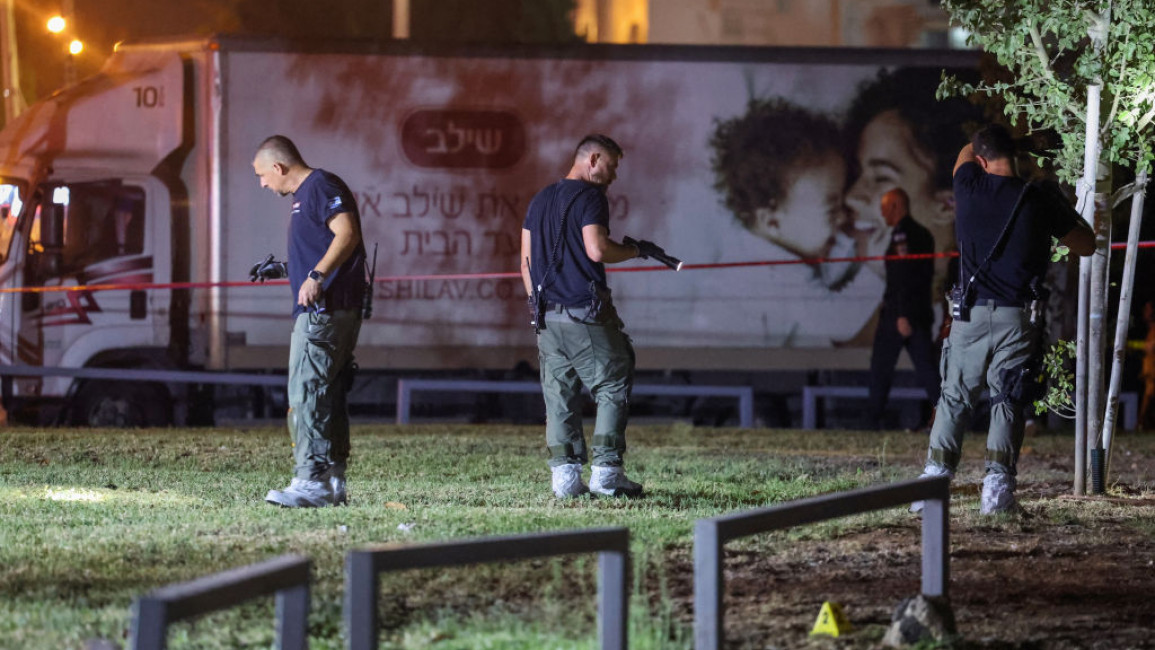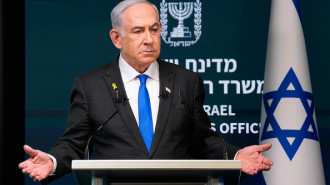Why are Palestinian armed groups in Gaza resuming 'suicide operations' against Israel?
The Palestinian armed resistance groups decided to resume "suicide operations" within Israeli territories, signalling a new phase in the fighting as Israel's genocidal war continues past its tenth month.
On Monday, the Palestinian Islamic movement, Hamas, and the Palestinian Islamic Jihad claimed responsibility for the Tel Aviv explosion on 18 August.
"In cooperation with our brothers in al-Quds Brigades, the armed wing of the PIJ, we have implemented the operation that took place in Tel Aviv," al-Qassam Brigades, the armed wing of Hamas, said in a press statement sent to The New Arab.
"The Tel Aviv attack came as a response to the ongoing Israeli crimes against our people in the Gaza Strip," al-Qassam noted, vowing to resume the "military attacks and explosions" in the Israeli cities.
Israel's police and the Shin Bet internal security agency described the explosion in Tel Aviv as a "terrorist attack", claiming that the target was a synagogue.
The suspect was identified as a Palestinian man from the Nablus region in the northern occupied West Bank. The explosion occurred near a synagogue, and Israeli security authorities believe the bomb detonated prematurely, with the suspect intending to explode it inside the synagogue.
Tel Aviv last witnessed a suicide operation in December 2013 when an explosive device exploded on an Israeli bus in the Bat Yam area. Back then, the Israeli authorities accused four young Palestinian men from the PIJ of the operation.
A new phase?
Osama Hamdan, a senior Hamas official, said in press statements that "the Palestinian resistance still holds cards to use in the confrontation [...] We have developed our tactics in fighting our enemy everywhere, all the time."
He argued that Hamas believes that the "new resistance tactics will have their own positive impacts on negotiations with Israel."
"The ongoing Israeli crimes against our people in Gaza will push our fighters to develop more and more methods to punish it, even inside Israeli cities," Hamdan added.
Despite the apparent failure in reaching the target, Palestinian political analysts believed that "such operation represents a defeat for an Israeli military and security efforts that lasted for 20 years, and represents a great success for the resistance in terms of timing and location and overcoming the complex security system."
In separate interviews with TNA, Palestinian analysts added that the Palestinian resistance likely adopted this tactic in confronting Israel, because all the diplomatic efforts made by mediators to stop the Israel's bloodshed in Gaza failed.
"Israel will not be able to bear the repercussions of the suicide operations, especially since its society has become exhausted from the ongoing war on Gaza, economically and security-wise," Hussam al-Dajani, a Gaza-based political analyst remarked to TNA.
"There is no doubt that the Palestinian resistance [especially Hamas and Islamic Jihad] excels at this type of suicide operations. They will return to the forefront with force as long as Israel continues its massacres against the population in Gaza and insists on rejecting ceasefire initiatives," he added.
On various occasions over the past ten months, the Israeli army claimed that it dismantled the majority of al-Qassam Brigades battalions in Gaza and that it was mulling a reduction of its forces on the ground while maintaining the possibility of deploying ground operations in Gaza whenever the security and field situation requires.
"This does not mean that the Palestinian resistance in Gaza has ended or that it does not control the course of events in the occupied West Bank and in Israel itself," remarked Adnan Samara, a Palestinian analyst based in Ramallah, in the occupied West Bank. "The resistance is united in all Palestinian arenas and therefore, the resistance may prefer to transfer the confrontation to Israel via these types of military operations."
"The Palestinian resistance resorted to suicide operations as a response to the US and international collusion with Israel in its inhumane war against Gaza," Samara added.
A response to failed diplomacy
Suicide attacks by Palestinian armed groups began in 1993 and continued until late 2004.
Back then, the Palestinian armed resistance group, including Hamas, Islamic Jihad, and Fatah, carried out at least 281 suicide attacks that killed around 800 Israelis and injured thousands more, according to Palestinian statistics.
At the time, despite the heated debate regarding the tactic, the majority of Palestinians did support these types of operations, considering it an "effective" weapon that impacted Israel and put all the settlers under pressure and fearful all the time
But the Mahmoud Abbas-led Palestinian Authority, with pressure from external, mainly Western backers, considered these types of operations harm all agreements with Israel
"Israel blamed these operations and launched large-scale military invasions into the occupied West Bank and Gaza Strip and killed a lot of innocent Palestinians," a Ramallah-based Palestinian official, who preferred to not mention his name, told TNA.
To curb this deterioration, the Palestinian Authority set up arrest campaigns against all Palestinian militants.
"We did our best through the political path and negotiations to achieve our goals as Palestinians and get our independent state over our lands. But, Israel destroyed all the political efforts of that," the Palestinian official argued. "Now, we can say that the two-state solution will never be achieved as long as Israeli Prime Minister Benjamin Netanyahu keeps his office."
Because of the diplomatic dead-end, many Palestinians argue believe that now is the best time for armed resistance groups to resume suicidal operations "to punish Israel for all its massacres and crimes against Palestinians".
Despite the human loss of the perpetrator, suicide attacks are considered "effective".
"It can be transformed into an effective tool to pressure the international and Israeli community and force Netanyahu to implement a ceasefire agreement in Gaza," Samara opined.
Hani al-Masri, another political analyst based in Ramallah, also shared a similar sentiment. "Suicide operations are one of the most important tactics of the military resistance to express its rejection of the status quo or acceptance of it," al-Masri told TNA. "The resistance should have restored the balance of deterrence between it and the occupation, which may force [Israel] to reconsider targeting civilians."
Al-Masri added, "The resistance will always remind [Israel] that it will not enjoy stability. The resistance will end the concept of security within Israeli villages and towns, and Israeli civilians will also pay the price in this war."
"The Israeli public cannot stand to live under an instability situation and dangerous life all the time, so they will pressure their criminal government to end its crimes against our people," al-Dajani, the analyst based in Gaza, also concluded.







 Follow the Middle East's top stories in English at The New Arab on Google News
Follow the Middle East's top stories in English at The New Arab on Google News

![Israeli troops Lebanon [Getty]](/sites/default/files/styles/image_330x185/public/2175253339.jpeg?h=a5f2f23a&itok=OAKHr8q-)
![Donald Trump [Getty]](/sites/default/files/styles/image_330x185/public/2183218031.jpeg?h=a5f2f23a&itok=qm9RQCxq)